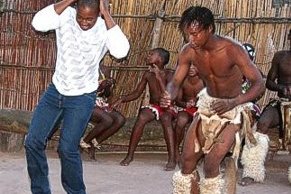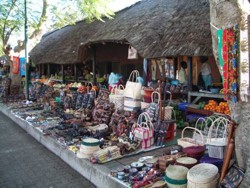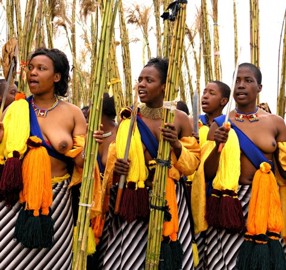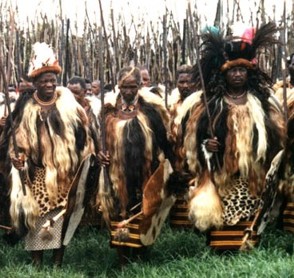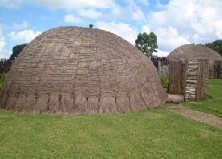|
Swaziland | South Africa Travel - Leisure Your secret African travel destinations: Zulu- and Swaziland cultural tourism
This is not an attempt to belittle the fantastic travel destination of South Africa, indeed one of the most exiting in the world, but it is a reference to the country's and region's high level of globalisation. No other African country is as industrialised as South Africa and as influenced by European and US culture, ranging from the contemporary cuisine to political structure. Cape Town, the Drakensberg Mountains, Johannesburg and the Krueger Park are all world famous destinations with their own flair. But they can hardly be called "secret" destinations. Also, they are not very representative of what is mostly considered distinctive about Africa. But you can still encounter age-old African culture that is alive and kicking in the region. In particular two of the many peoples in Southern Africa have been very conscious of preserving their cultural expressions and structures: the Zulu and the neighbouring Swazi. In particular the Zulu, mostly living in South Africa's south-eastern KwaZulu-Natal province north of the city of Durban, have a proud military history of regional conquest and resistance to the English and Boer colonialists. The Zulu national feeling is strong, directed towards their inkosi traditional leaders or king. In an otherwise heavily urbanised South Africa, where traditional leaders have lost most of their importance, only emigrated Zulu can afford to break away from loyalty to their leaders. Their political infl
But the cultural expressions distinctive to the Zulu nation are not on the retreat. Music, dances and traditional attire form part of the many festivals and ceremonies. But also daily life is shaped by traditions, including the social structure of an umuzi compound or village, food and drinks, traditional religion and witchcraft and the prevailing importance of cattle. For the traveller, a visit to an umuzi in the softly hilled green Zululand landscape gives the best introduction to this rich culture. Of course, the best way is to be invited to somebody's home. But there are also guided cultural tours to Zulu villages and even guest houses and lodges built according to the umuzi structure, which mostly communicate the Zulu feeling well. But of course you also should seek to experience a traditional Zulu dance and music event. And there are many returning events that call for dancing, either by young Zulu men and women together, or by only one of the sexes. You may be taken to a village where dancing ceremonies are being prepared, or you will be able to experience this forceful expression at your hotel or lodge. And if you "only" get to see a Zulu dance performance at your lodge, be sure it is a genuine and exclusive experience. Because, contrary to so many other cultures where dancers gathered together for the tourist show examples of dying or dead cultures, here in Zululand this culture is alive and the same dancers also participate at real ceremonies. No cultural trip is complete without some good shopping, and the Zulus are indeed great craftsmen. Also Zulu crafts ar
Driving through the Valley of a Thousand Hills, the majestic Zulu heartland, you will see scattered umuzis with traditional huts, the occasional wildlife, some of the best birdlife in Southern Africa and an explosion of green. Several museums and historic sites are worthwhile, including the reconstructed royal enclosure of ancient Zulu king Cetshwayo, the Vukani Collection Museum and Shakaland. Turning to more classical holiday tasks, KwaZulu-Natal can also offer some of the best beaches in South Africa, the astonishing UNESCO World Heritage site Greater St Lucia Wetlands Park, the eastern part of the Drakensberg Mountains, several safari-friendly game reserves and the beautiful and vibrant city of Durban. Swaziland Moving on, even further from the beaten track, our tour of cultural highlights in the region takes us to Swaziland, an independent landlocked kingdom bordering KwaZulu-Natal and Mozambique. Swaziland has not the same proud warrior history as Zululand, but modern developments - or rather resistance to modernity - have made it equally preservative of its culture. The Swazis are related to the Zulus, both in language and in culture, and most Swazi cultural expressions are varieties of those found in Zululand. Again, loyalty to the almighty King and his local chiefs is a key cultural expression. Traditionally built compounds with strict social s
In a Swazi village, the chief has an even stronger position, and it can be a good idea to be presented to him when visiting. Being lucky, you will get a good introduction to Swazi rural life, society and traditions. But you can also visit the Cultural Village in Mantenga Nature Reserve, which is a living museum of Swazi culture where you will be able to participate in classical Swazi lifestyle. The Cultural Village also has daily performances of Swaziland's exclusive dance traditions, which are a colourful and spectacular manifestation of Swazis' loyalty to the King. If you are visiting Swaziland in late August-September or December, you will be able to enjoy the country's two most important cultural events live. Then, respectively the Umhlanga and Incwala ceremonies are held, which many hold as even more exciting than the Zulu festivals. The Umhlanga or Reed Dance shows off Swaziland's unmarried girls, while at the Incwala, the King participates in the dances of mostly young men at the Royal Kraal at Ludzidzini. The Incwala is celebrated with forceful dancing for several weeks and is the country's most important ceremony. Also the Swazis pride themselves of a very rich and alive craftsmanship culture, most of the products being made for the home market. Here, you can indeed make good buys, including beautiful wood carvings, grass weavings, stone carvings, pottery, batiks and clothing. There is however a dark side to Swaziland's rich and somewhat retrospective culture. It is actively used to maintain and strengthen the totalitarian King's total co
But for now, Swaziland is a safe and secret travel destination providing you with authentic cultural adventures. Mbabane, the capital of the small kingdom, provides some fairly good hotels, but has very few sights worth mentioning. It is more rewarding to check into rural lodges around the country, which are better in communicating the peculiarities of Swazi culture and lifestyle. A drive into the scenic and green north the country is also rewarding. Travelling through Zululand and Swaziland to experience the region's rich culture, the best way would be to rent a car in South Africa, as most destinations are rural and take a lot of time to reach by public transport. Reaching the region, your best option is a flight to Durban international airport, which however has few intercontinental connections. The cheapest connection from Europe and America mostly is a flight to Johannesburg, where you can rent a car, find a bus or get a connection flight to Durban. Enjoy! Your secret African travel destinations series This article is one in an afrol News series dedicated to the many genuine and "undiscovered" travel destinations in Africa, published daily throughout the (northern) summer of 2010. Click here to get more inspiration and new ideas for travelling to the great and welcoming continent of Africa. By staff writers © afrol News
Current afrol News Top Stories
|
front page
| news
| countries
| archive
| currencies
| news alerts login
| about afrol News
| contact
| advertise
| español
©
afrol News.
Reproducing or buying afrol News' articles.
You can contact us at mail@afrol.com


